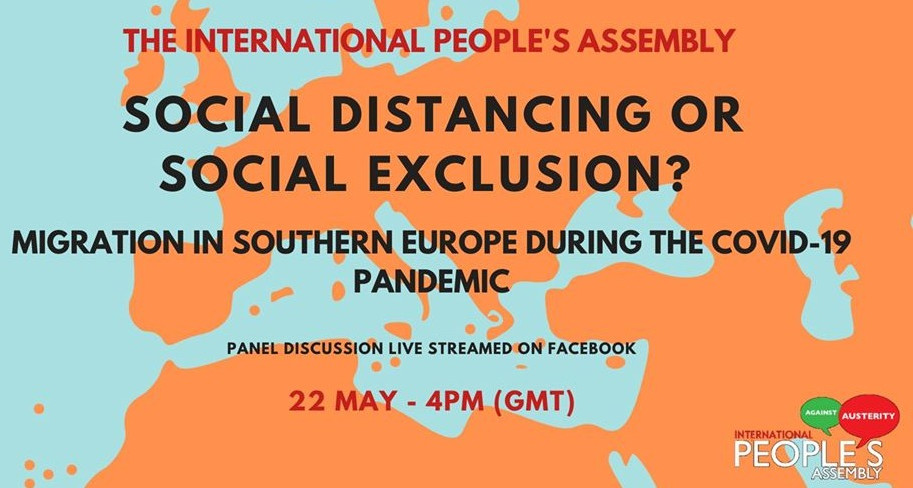Our society is experiencing physical and social distancing, but marginalised communities in Southern Europe have witnessed an even harsher social exclusion as a result of the measures of physical distancing.
Migrants in detention centres, hotspots and farmlands are required to maintain the same physical distancing measures that we are required to perform, but they are not offered nor the same rights as human and workers, nor the health security.
Join us on Friday 22nd at 4 PM (GMT) for the first episode of our new series of roundtable discussions, with a panel of activists from Greece, Italy, Portugal and Spain.
https://www.facebook.com/events/238072740784668/
Speakers include:
Francesca Esposito is a post-doctoral research fellow at the Center for Criminology at the University of Oxford. Her research work focuses on border violence, particularly immigration detention, and bottom-up forms of resistance and solidarity against border control practices. Her last project ‘Making Gender visible in Immigration Detention' looks at gender and sexuality in immigration detention, and at the gendered experiences of women confined in the UK, Portugal, and Italy. Francesca is a member of the feminist NGO BeFree (Rome, Italy), and the collective Migrações e Justiça composed by researchers, lawyers, activists and people with lived experience of border violence. She is also part of the Landscapes of Border Control project: https://www.law.ox.ac.uk/research-subject-groups/centre-criminology/centreborder-criminologies/blog/2020/01/landscapes-border
On Covid and detention in Portugal see here: https://expresso.pt/opiniao/2020-04-09-Carta-aberta.-Covid-19-e-os-Centros-de-Detencao-em-Portugal-41-associacoes-e-mais-de-100-cidadaos-pedem-libertacao-dos-migrantes?fbclid=IwAR0sdEN6DW-c3znP0cQSVmus5axdZTWpuSVNcA2MDFMqN1zHtUKnY6oUg6s
On migrants in Portugal during the coronavirus pandemic see here:
https://openmigration.org/en/analyses/the-shadows-of-the-portugals-migration-model/?fbclid=IwAR3-dxvuiFq0eerK3oIhckxNwM_miJb03GgEPhQEWwPO7DFebgP8qyrSTVQ
Irene Peano is a post-doctoral research fellow at the Institute of Social Sciences, University of Lisbon, and an active member of the militant network 'Campagne in Lotta', which supports the struggles of migrant farm labourers in different parts of Italy. She has conducted research on different forms of migrant labour exploitation and on the spatial dimensions of forms of containment and racialisation in contemporary Italy as well as on their genealogies.
Her work is here: https://www.opendemocracy.net/en/beyond-trafficking-and-slavery/containment-resistance-flight-migrant-labour-in-agro-industrial-district-o/
And more recent work on Covid-19 is here: http://www.criticatac.ro/lefteast/missing-farm-workers-in-pandemic-times-is-it-really-the-virus-fault-the-view-from-italy%EF%BB%BF/
Natasa Mimikou teaches Sociology. She cooperates with different organizations and NGOs, teaching Greek at migrant people and helping them to continue studying. She tries with her activities to support people and create a safe environment for them.
The current situation of migrants in Greece has been described here: https://www.ekathimerini.com/252641/article/ekathimerini/news/minister-says-11000-migrant-returns-pending
here: https://time.com/5806577/coronavirus-refugees/?fbclid=IwAR2KuiKLqdh3t0kjjft7DmW9TMfXSMvJIZkw6kzTfWiznIj_SEpstc8Tv5Q
and here: https://www.iom.int/news/iom-raises-concern-over-increasing-covid-19-cases-recorded-greece-mainland-refugee-and-migrant?fbclid=IwAR2uD1c_fl3-Bd16A9KOJFB8hozQGpIDHcKaumcGdUhfGBz6g-wOC4WMZoc
///////////////////////////////////////////////////////////////////////////////////////
Southern European countries are a point of arrival and a point of departure. Migrant people arrive on European coasts after long journeys where violence is an ordinary problem. But the arrival in Southern Europe is for many just another stop in their journey towards France, the UK, Germany or Scandinavian countries. Southern Europe is also where many of them are detained in repatriation centres; Southern Europe is where the notion of Fortress Europe has its most evident meaning. Since the outbreak of Covid-19, we have witnessed the brutality of Greek police and European officials in closing the European-Turkish border; less known is the fact that many people arrived in Lampedusa over the last weeks have been kept sleeping on the island dock to prevent contagion.
However, governments do not simply exclude migrants from our societies, through the use of detention centres and repatriations; they also actively exploit their labour through the use of certain economic and political practices: informal work, lack of political representation, bureaucratic procedures and the denial of working rights to migrant workers. This is crisis shows that undocumented migrants are fundamental workers - and exploited workers - to our economy. Ministers all over Europe are lamenting lack of ‘hands’ in agriculture, especially now that the harvest season is coming. Workers in this sector are however lacking for two main reasons: first, corona has halted movements, so that communitarian migrants - coming from Eastern Europe - do not have the possibility to come a as seasonal workers; second, many workers are present on the territories but are simply not counted as they do not have documents. In this context, activists for the rights of hired hands have replied to government demands that “there is not a lack of workers, there is a lack of rights”.
It is not just a struggle between life and death, it is also a struggle against forms of exploitation in the workplace.
